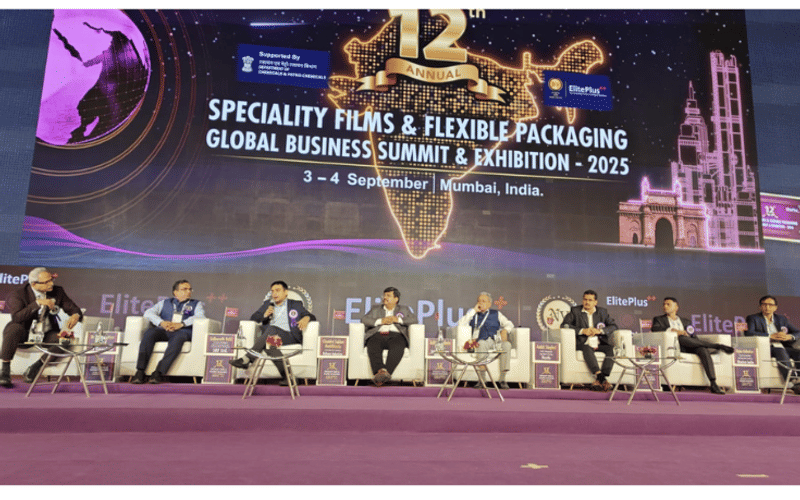ElitePlus Global Summit: Panel Discussion on plastics in circularity - new regime
The overall tone of the session was pragmatic: stakeholders across the chain accept circularity as both a moral and a strategic imperative.
08 Sep 2025 | By Sai Deepthi P
Jeevraj Pillai, director - sustainability and president - flexible packaging and new product development at UFlex, moderated a wide-ranging panel that probed India’s readiness for a new circularity regime. The debate brought together voices from across the value chain: Sidharth Behl of SRF, Aditya Dalmia of Dalmia Polypro Industries, Ankit Singhai of Nestle, Vishal Poojara of Mondelez International, and Bipin Odhekar of Marico India. Over the course of the session the panel assessed the technical, regulatory and commercial hurdles to scale recycled content in packaging and sketched a pragmatic path forward.
Professor Vimal Katiyar of IIT–Guwahati set the context of the panel discussion by reminding the audience that plastics are a high-performing material whose life-cycle and end-of-life management require urgent improvement rather than blanket rejection. He argued that recycling and feedstock innovation including renewables and alternative feedstocks, reduce carbon footprint and keep plastic molecules in productive circulation. He also cautioned against over-engineering packaging, which can introduce unnecessary chemistries and complicate recycling.
On the technical front, the conversation quickly turned to RPET and other food-grade recycled polymers. Sidharth Behl, vice president, business development, SRF explained that SRF has geared up to meet EPR mandates by investing in demetallisation, in partnerships with producer responsibility organisations for collection and sorting, and by pursuing FSSAI certification for PCR-based resins. He said SRF is working to ensure traceability and consistent quality so that recycled resins can safely enter food-contact value chains.
Ankit Singhai, lead - packaging and ingredients sourcing, Nestle, welcomed the regulatory momentum but urged caution. He described Nestle’s threefold approach of reduce, reuse and recycle and outlined the company’s work to redesign structures to accommodate higher recycled content. However, he warned that flexible packaging presents tougher QA challenges than rigid formats because of feedstock variability and fragmented supply chains. Nestle’s QA teams remain cautiously optimistic but require clear, implementable guidelines and trusted certification schemes to scale adoption.
Vishal Poojara, Asia Pacific sourcing manager flexibles & AMEA packaging sustainability leader, Mondelez International, expanded on the design imperative. He said circularity is an ethic as much as an engineering problem and stressed that design-for-recyclability must be embedded from the outset. Mondeldez pursues a two-track approach: global brands meet the strictest standards, while local jewel brands adopt law-of-the-land solutions. He reported that Mondelez has achieved over 96% design-for-recyclability globally and intends to increase PCR usage from around 1.6% in 2025 to higher levels by 2030, where regulation and availability allow.
From the recycler’s perspective, Aditya Dalmia, managing director from Dalmia Polypro Industries painted an encouraging picture of capacity build-out. He said close to 3,00,000-tonnes of RPET had already secured FSSAI approval for food use and that a further 7,00,000-tonnes of capacity would come online in the near term. Industry has committed substantial capital — several thousand crores — to scale up technology. Dalmia acknowledged that high quality comes at a cost, which currently slows adoption, and urged brands and recyclers to collaborate so that scale drives prices down and adoption rises. He also pointed to India’s deep informal collection networks as an asset rather than a liability, noting that formalisation through apps and PROs can rapidly improve traceability.
Bipin Odhekar described Marico’s Ambition 2030 programme and the metrics the company uses beyond recycled content. He said Marico has eliminated problematic materials such as PVC from almost all packaging, reduced material intensity and set targets to achieve 100% recyclable packaging by 2030. Odhekar emphasised dematerialisation and loadability improvements as levers to reduce plastic and emissions intensity, adding that packaging strategy is now assessed across ten sustainability matrices.
The panel also addressed polyester, polypropylene and polyethylene specifically. Ashish Saxena of UFlex underlined industry innovation on the polyester front, including investments to scale food-grade recycled polyester and a “single pellet” solution that pre-mixes 30% recycled content with virgin resin to simplify downstream use. He said UFlex has achieved FDA approvals for recycled content in polyester, PP and PE, and claimed an industry benchmark in improved polyester seal strength that enables wider use of polyester in recyclable mono-substrates.
Several panellists highlighted policy measures the government could take to accelerate adoption. Clarity, enforceable timelines and government-backed frameworks for traceability would justify private investment in R&D and recycling infrastructure. Standardisation of laminate structures and a push toward mono-material formats would make mechanical recycling far more effective. The draft standards and the FSSAI’s involvement in approving food-grade RPET were welcomed, but panellists urged harmonisation, transparent certification (akin to global recognised schemes) and regulatory consistency to bolster industry confidence.
In his closing remarks Professor Katiyar reiterated that polyolefin recycling remains technically complex, particularly for mechanical recycling and migration issues. He welcomed chemical recycling as a complementary route and stressed the need for indigenous technological development to scale polyolefin recycling.
The overall tone of the session was pragmatic: stakeholders across the chain accept circularity as both a moral and a strategic imperative, but they warned that success depends on co-ordinated policy, continued R&D, investment in traceability and an industry-wide commitment to design, standardisation and scale.


